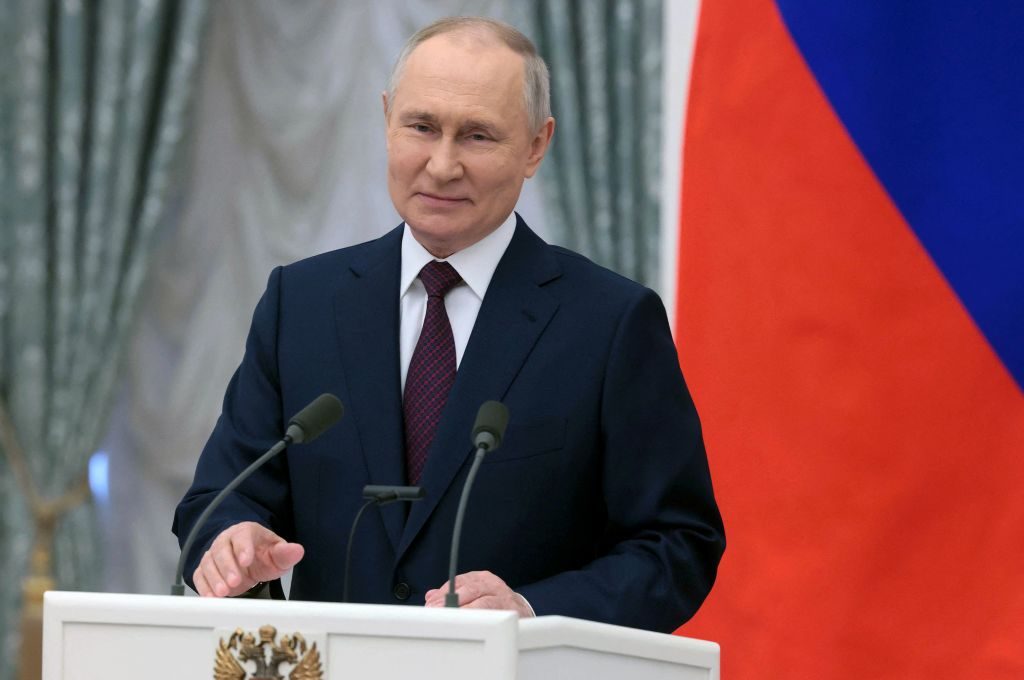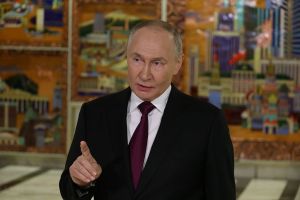With Russia’s brutal war against Ukraine showing no signs of reaching a conclusion, a recent study by the country’s main state-run pollster, VTsIOM, revealed that 91 percent of Russians consider themselves patriots. On the face of it, these numbers seem to vindicate two camps with a strikingly similar worldview. On the one hand, there is Vladimir Putin’s Kremlin, desperate to prove that he is fighting this war in the name of all Russians; and on the other, a growing handful of those in the West who claim to be supporters of Ukraine and Putin’s foes, but who insist with equal vehemence on the populist fallacy that it is not just Putin’s war, but that of all Russians.
A closer look at this same poll, however, reveals a striking irregularity: while 91 percent across the country call themselves patriots, that number goes up to 95 percent in Moscow and St. Petersburg, the places traditionally associated with the most anti-war sentiment. In other words, while polls like this in Russia may be intended to show vast support for the Kremlin, what they actually demonstrate is a basic notion that is entirely alien to Vladimir Putin: that for a great deal of Russians, love of their country and of their government are two different things.
Loving Russia has become exceedingly difficult
How Russians define patriotism is also telling: for 48 percent, it means working towards the good of the country and making it flourish — this is the definition chosen by more educated and affluent constituents, according to the poll, while those in rural areas and with less agency are more prone to think that patriotism means your country is better than others. Some 43 percent of internet users, meanwhile, believe that patriotism means telling the truth about your country — an activity that has been criminalized by the Kremlin and equated with treason.
Loving Russia has become exceedingly difficult since its government chose to launch an invasion of Ukraine in February 2022. On the one hand, for those at home, standing up for what they believe is in the interests of their nation can now land them in jail for life, as parliament ruled this week to make treason punishable by a life sentence. On the other, many in the West find it hard to understand how Russians can continue loving their country while abhorring the war. As a result, they often label those who do not actively and vocally protest against the Kremlin — even if this might endanger friends and family back home — as Putin’s accomplices. Shunned by the Kremlin for refusing to love their government, they are equally shunned by many in the West simply for existing and trying to get on with their lives. Indeed, how can one love a people, a society, when its most powerful component, the government and its supporters, is perpetrating a senseless war?
But just as love tends to swell when its object is suffering the most, it tends to crop up in spite of the greatest pressures upon it. No wonder, then, that the starkest expressions of true patriotism often come from the jail cell: “Even today, even in the darkness surrounding us, even sitting in this cage, I love my country and believe in our people,” said opposition activist Vladimir Kara-Murza, sentenced this week to twenty-five years for “treason.” Treason, in the eyes of the Russian government, was claiming that the Russian army was bombing Ukrainian residential areas.
Or take the words of another opposition figure, Ilya Yashin, sentenced to eight and a half years in December for spreading “disinformation” about the Russian army (he talked publicly about murders of Ukrainian citizens): “Do not despair,” he said from his cage. “This is our country. Not theirs. It is worth fighting for.”
In the past, I have disagreed with both Yashin and Kara-Murza about what exactly will serve in Russia’s best interests. Ultimately, that doesn’t really matter: a day will come, I hope, when our disagreement will be a necessary process in the path towards a common goal. Because in the darkness into which the Kremlin has plunged Russia, true patriotism — the desire to see your country prosper, flourish and be happy — stands out even more brightly against the backdrop of the lies peddled by Russia’s leaders. The simple truth is that a prosperous, content nation doesn’t wage wars of destruction against its neighbors.
In this light, the patriotism poll makes sense. Most Russians are cowed from expressing their true feelings, and while surveys purport to demonstrate that over 70 percent support the war, this is only of those willing to answer the question. According to the same pollster, most refuse to answer such dangerous questions in the first place. Speaking out against the war will land you in jail, but calling yourself a patriot is perfectly acceptable — even if, in many cases, both actions are part of the same stance.
Is it true that a proportion of those patriots support the war? Of course. But it is equally true that many Russians call themselves patriots not in spite of, but because, they oppose the war. Ultimately, Putin has invested his entire career in an effort to equate love of country with love of himself, and has expended enormous resources to stifle true patriotic feeling. It should be heartening to see that he is failing.
This article was originally published on The Spectator’s UK website.

























